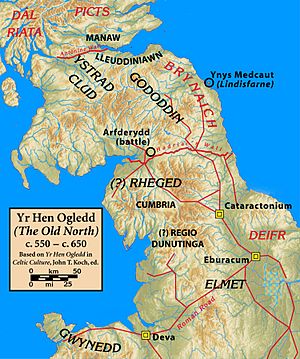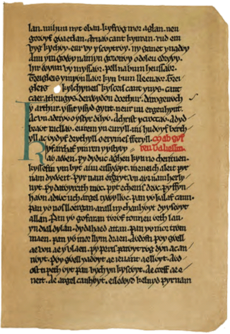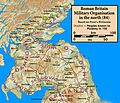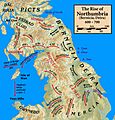Aeron (kingdom) facts for kids
Aeron was a small kingdom in a part of Britain known as the Hen Ogledd (which means "Old North" in Welsh). People there spoke an old form of the Brythonic language, which is related to modern Welsh. Experts believe Aeron was located in what is now southwestern Scotland, near the River Ayr.
Aeron existed after the Roman Empire left Britain, possibly even earlier. It disappeared sometime before or during the 600s, when a powerful kingdom called Northumbria took control of the area. We don't have many direct historical records about Aeron. Most of what we know comes from old poems and family trees that mention it. This makes Aeron a bit of a mystery, but it's still an important part of the history of both Wales and Scotland. This is because the people of the "Old North" and the Welsh saw themselves as one group, called Cymry.
Contents
Where Was Aeron?
The exact location of Aeron isn't totally clear from old writings. However, most modern experts think it was in the Ayrshire region of present-day Scotland. This area, around the River Ayr, was part of the "Old North" during the time after the Romans left.
One reason for this idea is that the name Aeron sounds very similar to Ayr. Some scholars, like William J. Watson, thought both names might come from an ancient word like *Agronā, possibly meaning 'Goddess of Slaughter' or 'Queen of Brightness'. This idea has been discussed a lot since it was first suggested in 1926.
Another clue comes from old poems, especially those in the Book of Aneirin. These poems suggest that Aeron was close to the kingdom of Rheged, ruled by a hero named Urien. Urien was even celebrated as Aeron's protector. Later poems also link an "Aeron" with "Clud," which some believe refers to Alt Clut (modern Dumbarton), a famous kingdom in southwestern Scotland. While some experts, like Ifor Williams, are careful about this link, they still agree that the mentions of Aeron in the Y Gododdin poems make the Ayr area a likely spot.
Some scholars, like Williams and Rachel Bromwich, have also suggested another possible location: along the River Aire in Yorkshire, England. This would place Aeron next to the kingdom of Elmet. However, the Scottish location is more commonly accepted.
How Do We Know About Aeron?
We don't have official government records or detailed histories about Aeron. Instead, our information comes from a few different sources:
- Old Poems: Aeron is mentioned in ancient Welsh poems, like those in the Book of Taliesin and the Book of Aneirin. These poems praise heroes and describe battles. Aeron is often mentioned as the home of several heroes.
- Family Trees: The families of some heroes mentioned in these poems also appear in old royal family trees. These genealogies (family histories) are linked to the kings of Alt Clut, a well-known kingdom in southwestern Scotland. This connection helps experts guess where Aeron might have been. For example, Cynon's father, Clydno, is mentioned in these family trees.
- Other Historical Clues: Some of the men mentioned in the poems, like Clydno, were involved in a war between the "Men of the North" and the kingdom of Gwynedd in Wales around the late 500s. These details, though not directly about Aeron, help historians understand the time period and the connections between these early British kingdoms.
It's important to remember that these sources are not like modern history books. They are often poems or lists, so historians have to piece together the story of Aeron like a puzzle. Many respected historians of Wales and Scotland don't even mention Aeron in their main works because the evidence is not direct. However, some, like John Koch, do mention it as a "probable" kingdom in Ayrshire.
History of the Region
To understand Aeron, it helps to know about the history of southwestern Scotland during that time.
Roman Times
When the Roman Empire was in Britain, they built many forts in southern Scotland and northern England. But in the region where Aeron is thought to have been, there were no Roman forts. This suggests that the local people might have had a friendly agreement with the Romans, rather than fighting them. This allowed them to continue as a tribe or kingdom. There's no sign that the Romans ever went to war against the people of this area.
Early Kingdoms
The earliest written mention of this region comes from a map by Ptolemy around 150 AD. He said it was the land of the Damnonii people. Later, this area became the Kingdom of Alt Clut. The old family trees that link Aeron to Alt Clut fit with this idea, even though they don't fully prove it.
Northumbria's Rise
Aeron could not have lasted as a kingdom beyond the 600s. This is because the powerful Kingdom of Northumbria began to conquer all of Scotland south of the Firth of Clyde and Firth of Forth (two large sea inlets).
The key years were in the mid-600s. A big battle called the Battle of Winwaed happened in 655 AD. In this battle, Penda of Mercia, a powerful king, led an alliance of different groups, including the Welsh and people from the north, against Northumbria. But Penda was defeated and killed. This battle cemented Northumbria's control over most of Britain, from central England up to the Scottish firths.
After this, Alt Clut managed to regain its independence. However, all the other Brythonic-speaking kingdoms north of the Solway Firth and River Tyne were gone forever. This means Aeron, if it existed, would have been absorbed into Northumbria or disappeared around this time.
See Also
Images for kids
 | James B. Knighten |
 | Azellia White |
 | Willa Brown |






